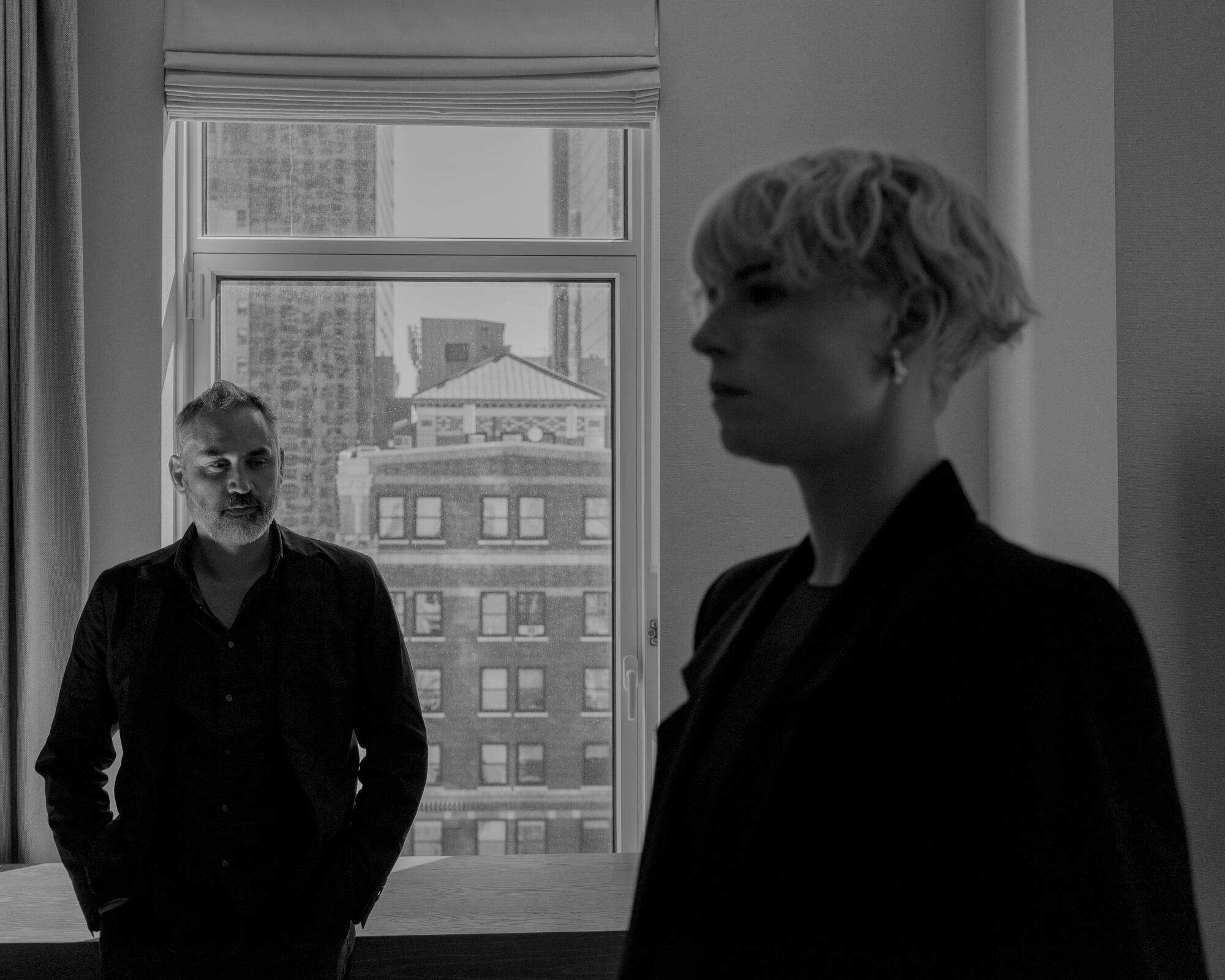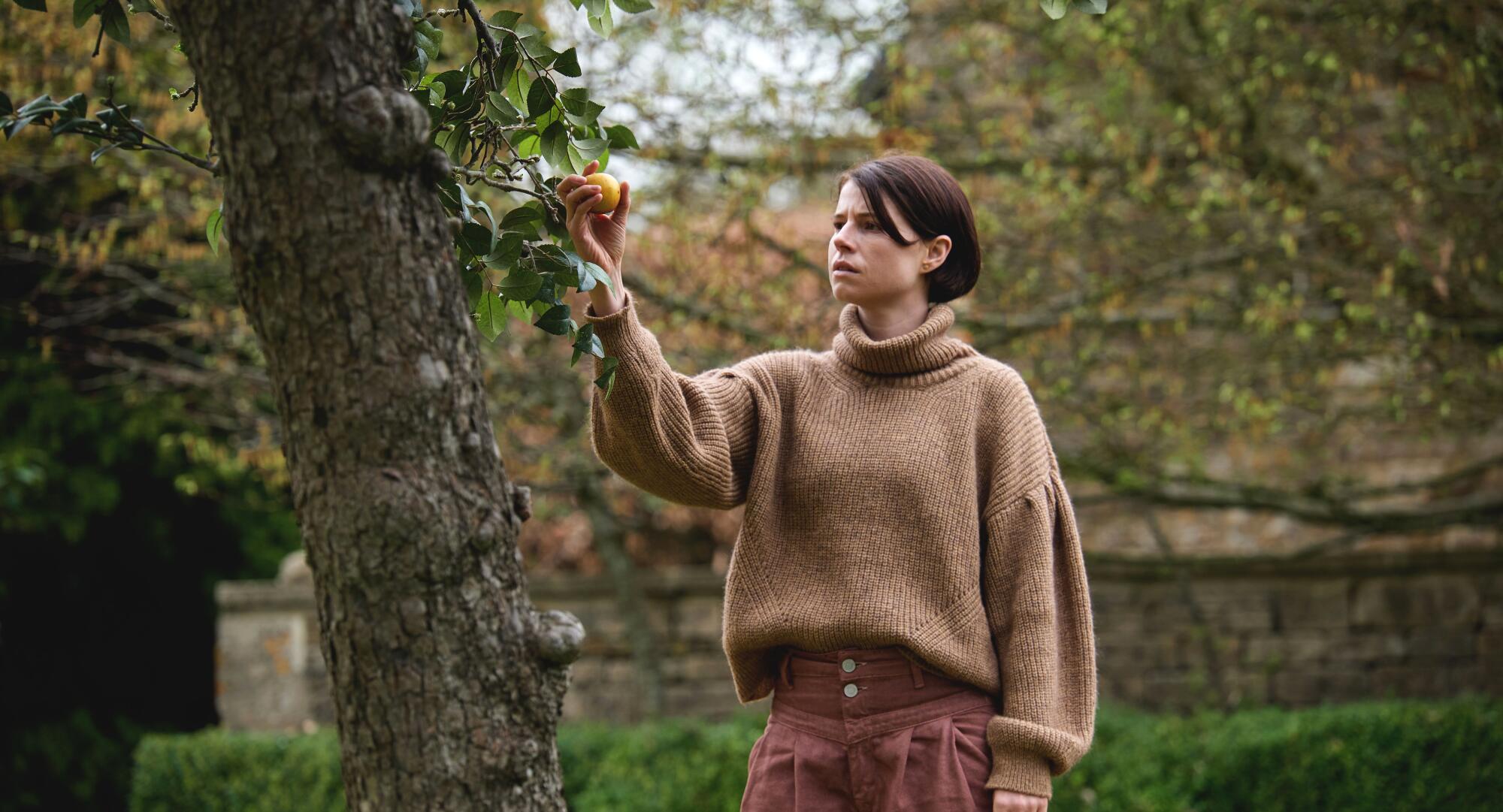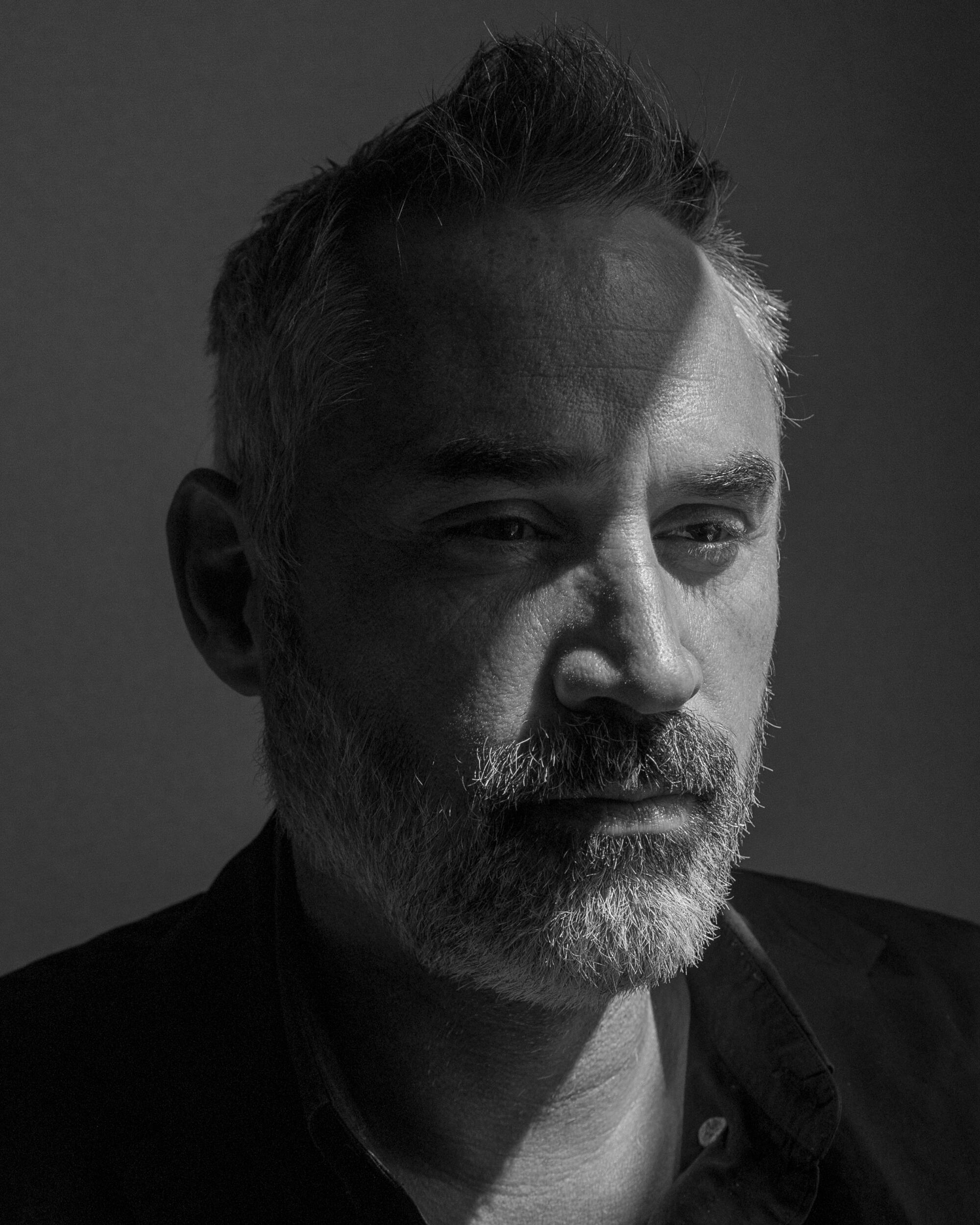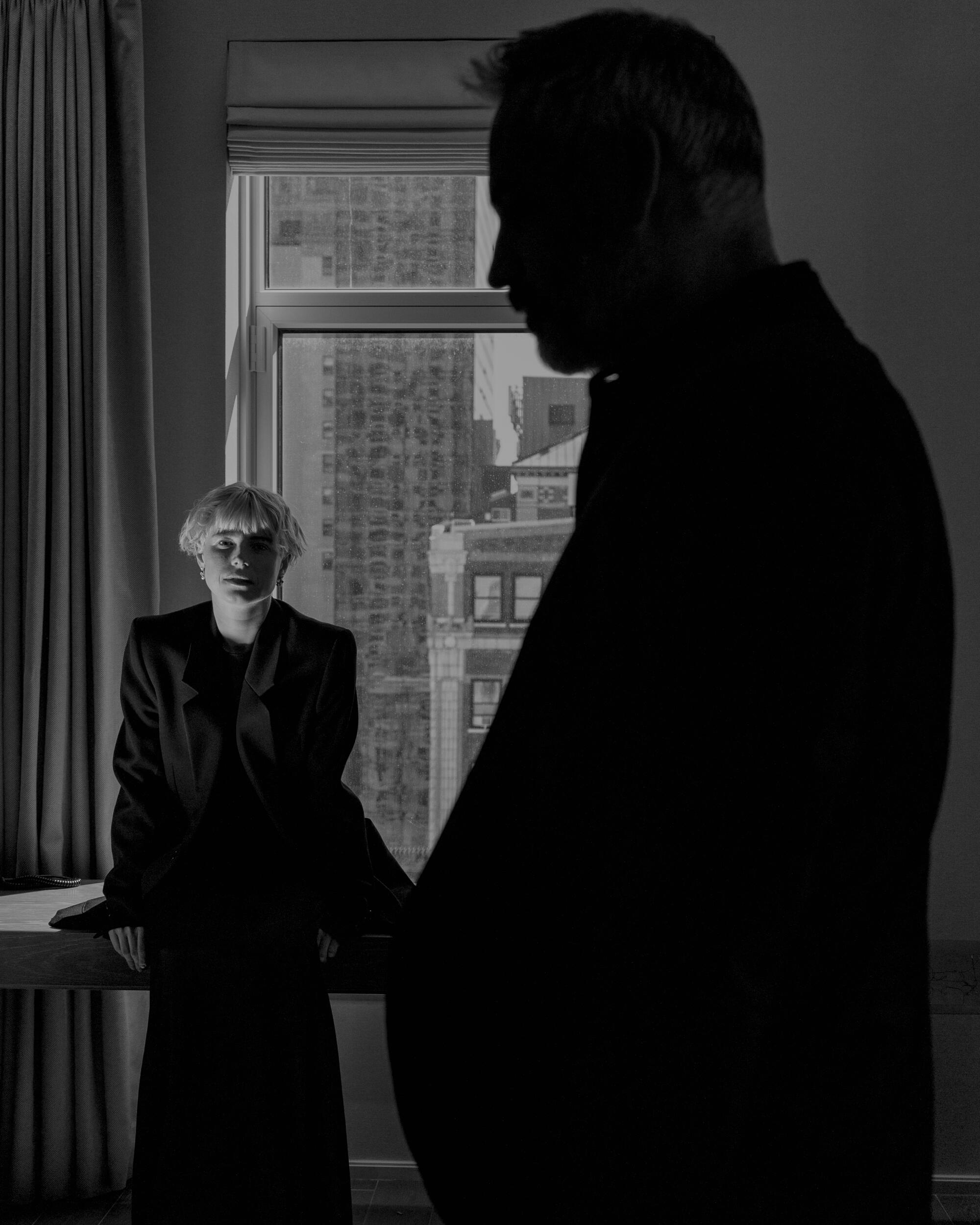- Share via

Like the previous films he’s directed — 2014’s “Ex Machina” and 2018’s “Annihilation” — Alex Garland’s new folk-horror film “Men” has a lot going on underneath the surface: themes of gender and toxic masculinity, ancient signs and symbols, literary references to everything from the Bible to Yeats.
But don’t expect Garland to unpack it all for you. The last thing he wants to do is mansplain “Men.”
“I’m sure there will be a range of opinions and a range of responses to the film,” the British writer-director said recently over Zoom. “I see a group of people who make a film as, in some small way, being participants in a conversation. The film is just a space to turn things over in one’s head. What is front and center is not what you’re thinking about but what you’re feeling.”
On that score, “Men,” which rides into theaters Friday on a wave of generally strong reviews, is certain to spark plenty of strong feelings.
Jessie Buckley stars in the A24 release as a woman named Harper who retreats to a picturesque English cottage following the death (whether by accident or suicide is unclear) of her estranged husband (Paapa Essiedu). Seeking solace in the tranquil, bucolic countryside, Harper finds herself terrorized and gaslit by a series of men, including a naked stalker, a creepy vicar and a local policeman — all of them played by actor Rory Kinnear.
Influences: Less MeToo than Green Man
A gender-inflected psychological thriller with echoes of such classics as “Repulsion” and “Rosemary’s Baby,” “Men” seems tailor-made for the MeToo era, its very title a kind of blunt provocation amid the fiery debates over sexual harassment, misogyny and rape culture. But Garland says the film actually predates the MeToo movement, continuing a preoccupation with dynamics of power and sexuality between men and women that has run through all of his work — if not all of human history.
“I’ve been working on a version of the script for about 15 years,” said Garland, 51. “Those concepts way predate MeToo. MeToo was like a sudden intense focusing of attention on something. But it wasn’t a new thing. It was an old thing, like centuries or millennia old.”

For Garland, the starting point for “Men” was an ancient piece of pagan iconography found across Europe known as the Green Man. “In medieval churches, you’ll see this male face with leaves pushing out of the mouth or intertwining with beard,” he said. “You’ll see it on Victorian buildings. There’s pubs called the Green Man Pub. It’s so commonplace but people don’t ever notice it particularly. And that always interested me.”
Inspired by the Green Man and by similarly mysterious pagan carvings of women displaying their genitalia known as sheela na gigs, Garland sought to craft a folk-horror tale that tapped into primal fears and misperceptions that have animated gender relations all the way back to the story of Adam and Eve — another creative touchstone for the film.
“To me, the film is like a fairy tale or a fever dream,” said Buckley, who is coming off her Oscar-nominated turn in the Netflix drama “The Lost Daughter.” “You know, toxic masculinity and MeToo — of course they’re in there. But for me, I’m more interested in the relationship that we have between each other as man and woman and asking why these kinds of things recur again and again throughout time. Where’s the source of the wound?”
One actor to play them all
In casting Kinnear to play all the male roles in the bucolic but eerie village, from the seemingly benign caretaker of the house where Harper stays to a mentally disturbed 9-year-old boy, Garland seems at first glance to be suggesting that all men are, deep down the same — and equally capable of violence and cruelty toward women. But even there, the director says, things aren’t so simple.
“Does Harper see all men as the same even though they’re not? Or does she not realize that, in fact, they are all the same?” Garland said. “Those are wildly differently interpretations, and the question is in no way answered by the film. You could watch this movie and say it’s just a ghost story: This young woman is bereaved and goes to the countryside and gets essentially haunted by either the memory or the manifestation of her dead husband’s sadness and anger. It should just be able to function like that if that’s what people wanted.”
Indeed, Kinnear — who says the two-week rehearsal period before shooting began was “like a therapy session” — argues one could see the film not as an allegory about toxic masculinity but rather a story about emotional trauma.
“Yeah, you can project out of Harper’s story something about contemporary society and traditional gender roles throughout history,” Kinnear said. “But you can also see it as the story of a woman who’s suffered a traumatic event and how she processes that trauma and how that trauma keeps on raising its head, albeit in different guises. For me, that’s how I found it the most affecting.”

Some viewers may not even realize that Kinnear is playing some ten different roles in the film, so fully does he disappear into each one with the help of makeup, prosthetics and subtleties of performance.
“There was a risk that it could become a kind of virtuosic acting exercise but I wanted all these characters to sort of seep out of the countryside,” Kinnear said. “Obviously they are archetypes and tropes but Alex was very keen, as I was, to make sure that they were all credible and fully rounded individuals. So the first thing I did was to write a biography for each one of them, even the ones that I knew were only going to be on camera for a very short period of time.”
As a rule, Buckley says she generally avoids horror films (“The last one I saw was probably when I was eight”). But while her character spends nearly the entirety of “Men” in a state of paranoia, grief and terror, in the end she had a surprising amount of fun working on the film, though it did unquestionably get under her skin.
”Me and Rory got on like a house on fire,” she said. “In between the horror, we had huge laughs. But when I would go home on the weekend, anytime my partner came into the room I just screamed. He was like, ‘Jessie, I live here!’ So that was the one thing that kind of stuck with me for a few weeks.”
Let the audience decide
“Men” is only the third movie that Garland — whose screenwriting credits include “28 Days Later” and “Never Let Me Go” and who created the FX series “Devs” — has directed. While he’s already at work on his next directorial effort, an A24 action epic called “Civil War” starring Kirsten Dunst, he expresses a certain wariness about the business aspect of making movies.
“I’ve got a side to me that is mercenary about creative freedom,” he said. “The second someone is dumb enough to give me the money to make the movie, I kind of ignore everything and push it as far as I’m able to push it and worry about all the consequences later. I’m not really thinking at all about box office.”
That said, though he is loathe to tell people how to interpret “Men,” Garland does hope that the film sparks a debate over what exactly it is saying — or not saying — about some of the most hot-button issues fueling the current culture wars.
“As much as possible, I’m not going to get involved in polarized hysteria,” he said. “That polarized hysteria can make everyone else shut up because they’re too afraid, and I don’t want to be part of that. There’s a requirement for all of us to be thoughtful and show care when stepping into subject matters with these kinds of sensitivities. But that shouldn’t prevent one from making a strong statement.”

More to Read
Only good movies
Get the Indie Focus newsletter, Mark Olsen's weekly guide to the world of cinema.
You may occasionally receive promotional content from the Los Angeles Times.








